Jan 17 2017.
views 1123In Conversation: Cathy Marie Buchanan
Cathy Buchanan spoke about her two novels ‘The Day the Falls Stood Still’ and ‘The Painted Girls.’ Both romantic novels she enlightened the audience about her journey as a writer with each book. She was very open and honest and answered all their questions as well.
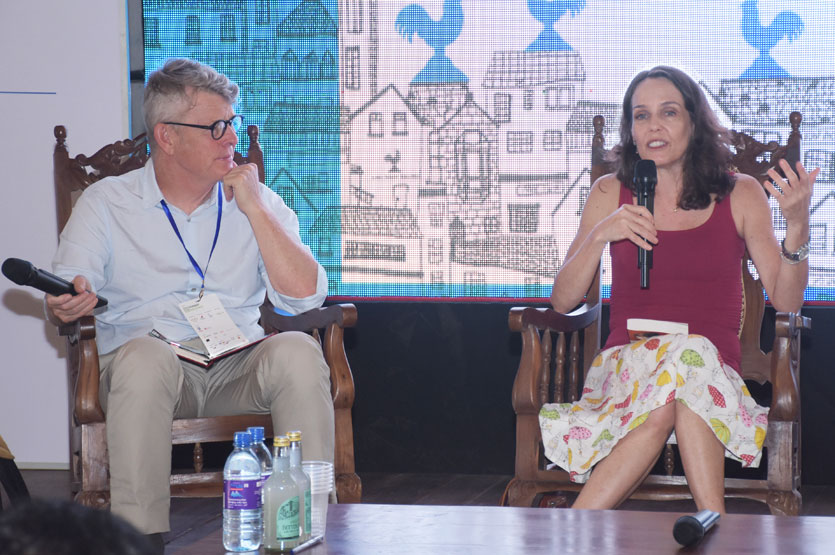
She guided us through her process for writing a book and confessed that she prefers to write historical novels as they have a guide and milestones to achieve it. She also does all her research upfront sometimes taking trips to where she is basing her novel to experience it firsthand. “When beginning a novel I lay in the middle in the range from I know everything to I know nothing.”
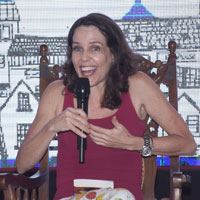
She also explained how her novels have strong sense of sisterhood as she has 3 of her own and grew up with them. “It comes through whether I like it or not!”
Her openness and honesty was certainly helpful to all aspiring writers as she even addressed the process of doubt and re-writing.
“I am extremely happy about being invited to Sri Lanka. My love for travel is also the inspiration for me to write historical novels.”
Photographs by Kushan Pathiraja
Thinking Out Loud: Kate Tempest on Let them Eat Chaos
I haven’t seen any poet being able to hold the attention of around 100 people for more than half an hour quite like Kate Tempest did. She was absolutely amazing and I found myself speechless at the end of it. Her style is free verse performance poetry and she delivered a powerful recital that tackled many things from war to children to fear to hope and the way forward.

She ended the performance by pleading with the audience “room full of strangers please wake up and love more.” She went on to explain the relevance of the poem had to the place no matter where the story was told. She received a standing ovation as she exited the pavilion and some were in tears.

We spoke to some members of the audience who still processing her performance, most of them were stuck for words.
Anya Weerasinghe
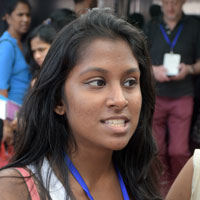
“It was a really moving performance and it is amazing how a poem written for London can be so appropriate here.”
Carol Taylor
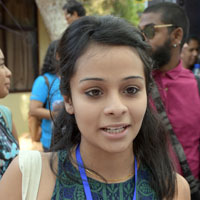
“This poem originally written for London can be applied so well here. The struggles faced by society with industrialization and forgetting humanity is same everywhere.”
Richard
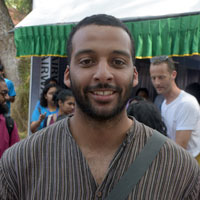
“Powerful reminder of the human condition at the moment.”
Michael Ketigian

“I have been a fan of her work for some time. The lyric ability infused with vibrancy draws me. Her style and message is great! She is also consistent throughout her performance and the meaning of the poem and the words begins to work o you afterwards.”
Alexander Woollcombe

“Amazing performance. She combined anger and hope in an inspiring way.”
Aditi Veena

“It was a relevant poem and a superb performance! I would have come to Sri Lanka and the Lit Fest just to witness her perform!”
Eva Priyanka Wegener
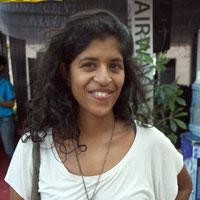
“I am a yoga teacher and it amazes me to see how different disciplines teach you to be empathetic and have hope. I am thankful she was a part of the festival.”
Photographs by Kushan Pathiraja
In Conversation: Sunila Galapatti on A Long Watch: War, Captivity and Return in Sri Lanka
It was a full house! It took place at the Maritime Museum and the organizers even had to hold some latecomers from entering the hall as it was packed. The book deals with a life story of Commodore Boyagoda who became the highest ranking prisoner detained by the Tamil Tigers. For eight years he had lived at close quarters with his declared enemy and Sunila Galapatti spoke about how she worked with him to give a voice to his story. This a side of the war that was not been previously explored.

Sunila Galapatti spoke exclusively to Life Online about her experience:
“It was surreal to be at the other side of the festival. I organized the festival in 2009 and 2010 and afterwards I was a frequent festival goer and it has been a different experience all together to be on the other side. It was nice to see so many people in the audience. Most of the sales have been within Sri Lanka which is what I wanted. The book is now going in to reprint which gives me great joy. I also hope to translate the book to Sinhala and Tamil to make it more accessible but I do want to publish both simultaneously. It is not an easy task. Currently I am enjoying the festival greatly!”
We also spoke to some from the audience to receive their comments:
Shyamali
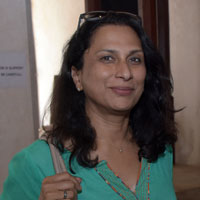
“The book is fantastic. It gives firsthand information through the main character. As it is a true story I found it very interesting.”
Mark
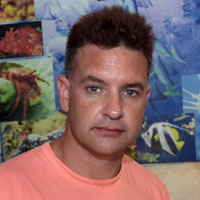
“Interesting and controversial at the sametime.”
Narmada
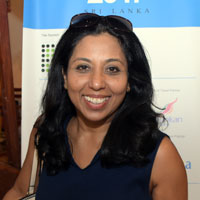
“I enjoyed it. I have read the book and through this session I heard her side of the story and got answers to my questions.”
Savitri Rodrigo

“It is a story that was wanting to be told and many would have not have had access to it if Sunila didn’t articulate it the way she did.”
Christina and Tommy

“A good story”
Prinko Holsinger
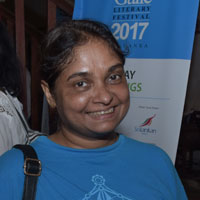
“Very impressed with Sunila’s account. It was a great effort especially not letting her voice come through the commodore.”
Tania

“Very humane effort. The session included lovely readings. Was cautious because is a delicate subject.”
Geenadi Ramanayake
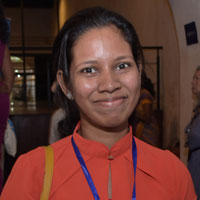
“Very nice. It is interesting to see how people look at post war Sri Lanka. We need translations to Sinhala and Tamil”
Photographs by Kushan Pathiraja
In Conversation: Katherine Boo on 'Behind the Beautiful Forevers'
Katherine Boo is an investigative journalist who documents the lives of people in poverty. “Poverty is abrasive and cruel” she said as she spoke about what it was to document their lives.

Her book ‘Behind the Beautiful Forevers: Life, Death and Hope in a Mumbai Undercity’ is a nonfiction book about the life of Abdul, a garbage sorter, falsely accused of a crime he never committed. He won the non-fiction prizes from the National Book Award for Nonfiction, the LA Times Book Awards and many more.
At the session, she spoke of the difficulty about writing a novel based on real life incidents that unfolded in front of her and of the people she has met and listened to stories of.

“I’m amazed. She’s embedded the lives of so many people in her book and it’s just so realistic” – Anthony
“An enlightening discussion on the Mumbai community and the unheard struggles faced by them” – Anonymous
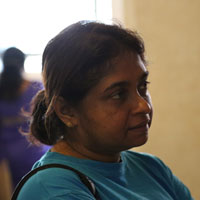
“I liked her session. From her discussion you could tell how much she cared for the people” – Prinko

“An excellent discussion. I thought it was very good” – Dylan
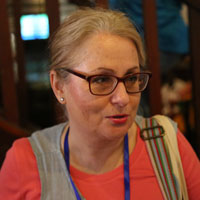
“An inspirational lady. So amazed by how much she cares and it really came through when she spoke. My mind is blown away!” – Sue
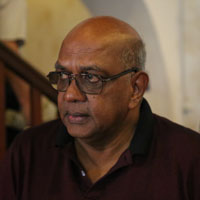
“I’ve read her book before and I thought it was a really good session” – Suren
Photographs by Zeeshan Akram Jabeer
The Deep Read: Lesley Hazleton on 'The First Muslim' and 'Agnostic: A Spirited Manifesto'
British-born, Lesley Hazleton is a psychologist and veteran journalist turned author whose work focuses on the interaction of religion and politics.
Her novel, ‘The First Muslim: The Story of Muhammed’ follows the story of Muhammad’s rise to power and his impact on the world.
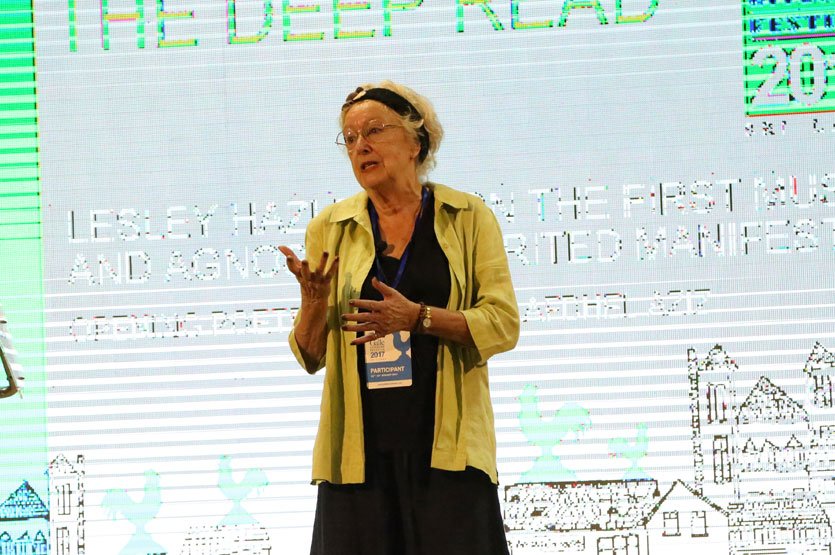
At her session she reveals that when she wrote the book, her target was for the non-Muslim community.
“I was surprised by the reaction of the Muslim community however. People have come up to me and told me that I bought the prophet alive for them and some people even converted because of my book.”
She further goes to explain what it means to be an agnostic and explains that her beliefs lie in the center between belief and disbelief.
When asked why she wrote the book, Hazleton replies “The book I want to read wasn’t written yet and that’s why I wrote the First Muslim”
We spoke to some of the audience members who attended the session to gather a few comments;
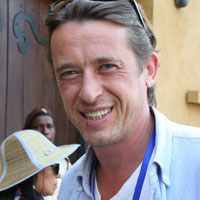
“It was very interesting to me” – Mark

“I thought it was rather controversial but I think she wrote the book from a good and honest place” – Amy

“It was fantastic and informative. It was a good set up and was well organized” – M. Kothan
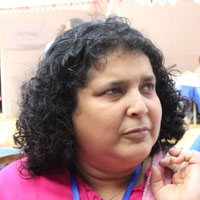
“I loved the different view and in her book it was written in such a way that it just made anyone sound human, even muhummed” – Shamila

“Excellent” – Barbara
Photographs by Zeeshan Akram Jabeer
The Deep Read: Philippa Gregory on her novels
Philippa Gregory is an established historian and writer since 1987. Her books based on the Tudor period are highly acclaimed and has a wide fan base around the world. Her novel ‘The Other Boleyn Girl’ won the 2002 Romantic Novel of the Year Award and was made into a TV series and a major film.
At her session, Gregory having written a plethora of novels stated that she stopped counting at 30 books. When asked if there is anything she doesn’t know about the Tudor period when discussing her books, she wittily replies, “well of course! I tend to not know what exactly I don’t know”
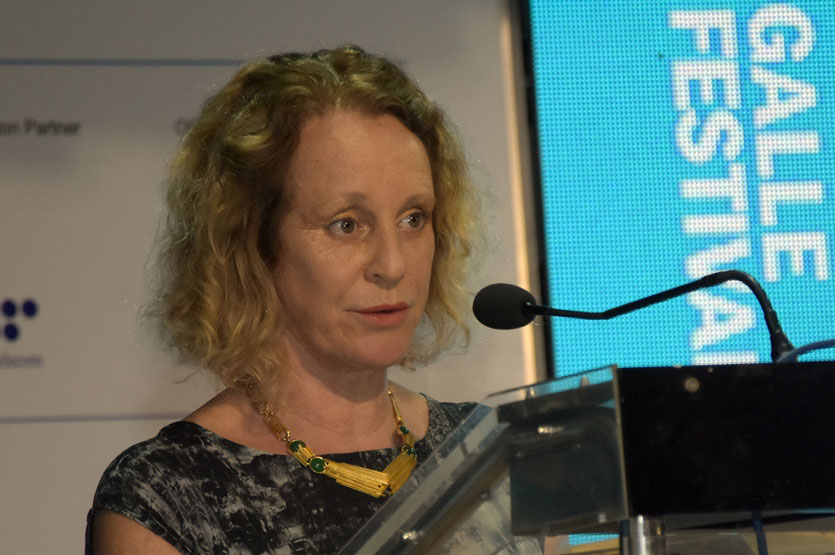
She discussed indepth about her novels, the historical background, the powerful women portrayed on her novels, the personality of the king and what it was to write books based on a famous period of time.
“The difficulty of writing a historical novel is that you don’t want to romance it” she stated, “you want to stick to the facts and build around it”

We spoke to some of the audience members who attended the session to gather a few comments;

“Quite interesting” – Ingrid
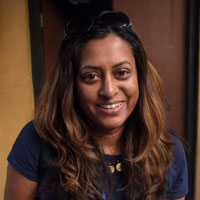
“Brilliant. I loved the books and the period of history is just utterly fascinating” – Milhara
“It was an interesting way of learning history” – Anonymous
“A delightful session” – Mahes

“Interesting how she spoke of the different roles of historians and novelists and how they interchange” – Tony S.
Photographs by Kushan Pathiraja
The Edward Lear Prize For Poetry Award Ceremony
The inaugural Edward Lear Prize for Poetry sponsored by The Owl and the Pussycat Hotel took place on the 13th of January 2017. It will be presented annually up to 10 years. It will be given to young poets between the ages of 10 to 30. The founders of this prize Reita Gadkhari and Shane Thantirimudalige hope this prize will encourage upcoming poets to show case their talents.
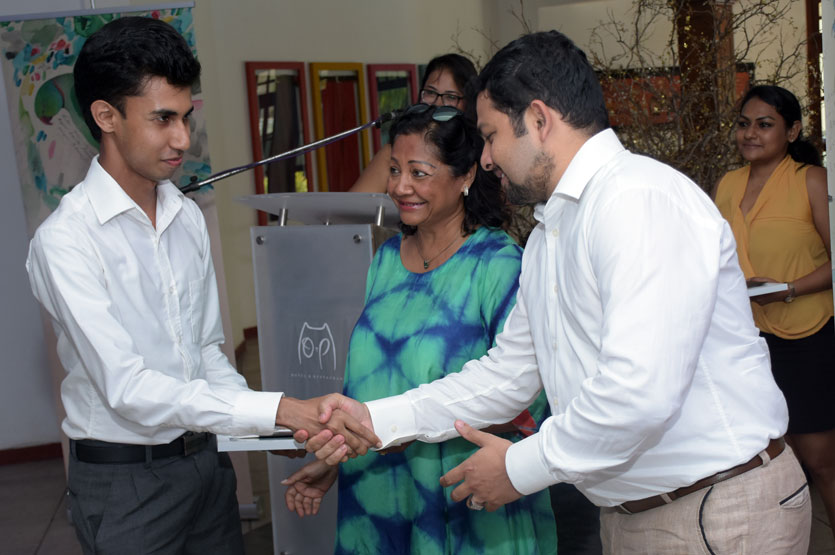
The shortlisted poems from the many applicants included ‘The Funny People of Sri Lanka’ by Ashwin Dias, ‘In Quest for a Grander West’ by Rashmika Nawbuwasam, ‘Red Shoes’ by Shara Jaufer, ‘Misfortunes of a Fisherman’s Daughter’ by Pawan Kalugala and ‘Small Scene’ by Shafni Awam.
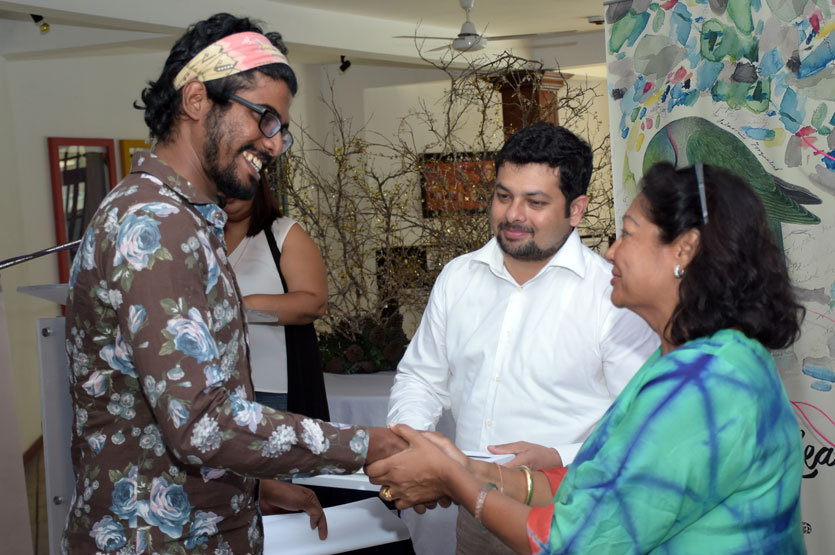
Dilhani Thantirimudalige addressed the gathering representing the judges and explained the criteria for choosing the winner which included relevance to theme, judges preference etc.
Kate Tempest also delivered a powerful performance which was a treat for those present. The winners were announced soon after.

Ashwin Dias was named the winner and received a grand prize of Rs.250, 000. Rashmika Nawbuwasam was named 1st runner up and awarded 150,000 and Pawan Kalugala 2nd runner up and awarded 75,000.
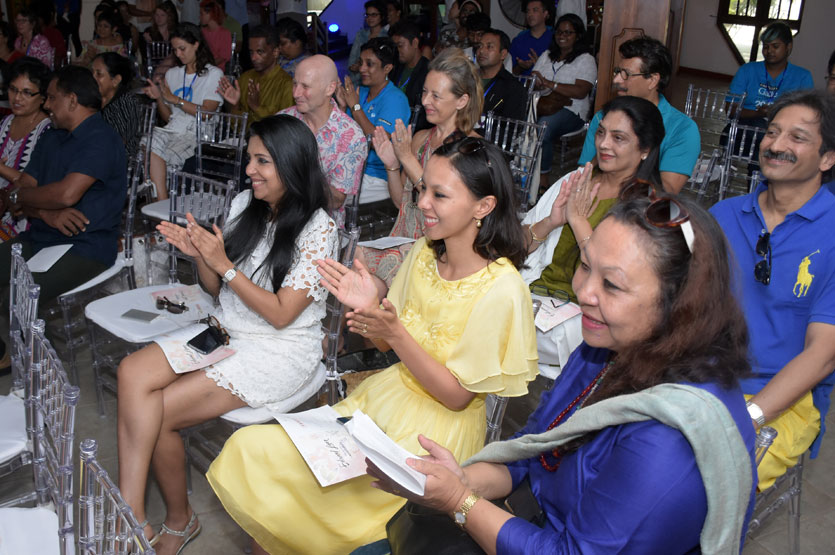
Some of the poets were not present so Life Online spoke to those who were and the representative of judges:
Sarah Jaufer

“I wrote poetry for as long as I remember and it is a big deal for me that I was shortlisted. I did it for the exposure and experience.”
Rashmika Nawbuwasam

“I started writing poetry just 2 years ago and I am currently studying to be a pilot and writing a novel.”
Dilhani Thantirimudalige

“The Edward Lear Poetry Competition was a first time thing in Sri Lanka. We had received some very good entries from which it was a hard task to choose a winner. It has brought a new level of young adults to participate and thus preserve literature through poetry.”
Photographs by Kushan Pathiraja
The Fairway National Literary Awards
Following its success in 2016, the Fairway National Literary Award was held for its second consecutive year at the Fairway Pavilion at the Fairway Galle Literary Festival 2017.
The Award is a recognition for the best novels across the Sinhala, Tamil and English mediums written by Sri Lankan authors and published in Sri Lanka.
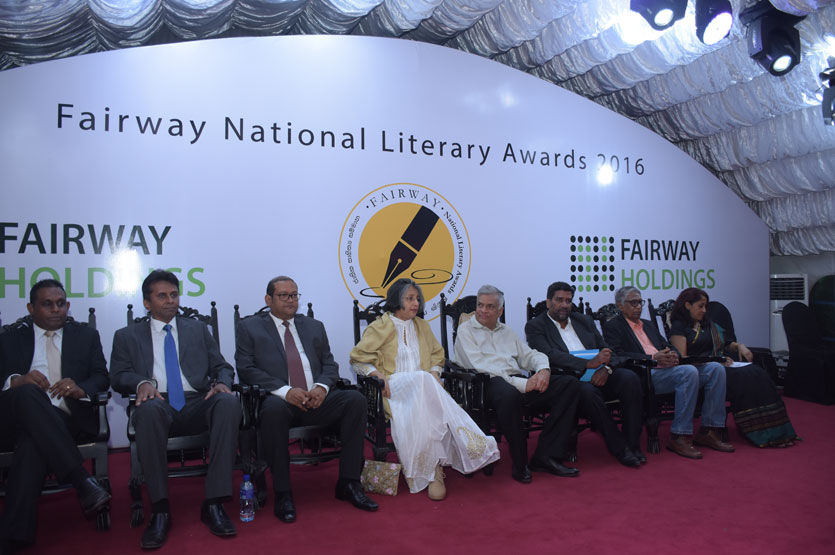
Hosting this award, the Fairway Holdings expressed that their belief is such that CSR activities should be on supporting, developing and improving the community and as such believe that the literary award ties into these ideals.
“This is beyond commercial benefits for us. This is about recognizing established writers and encouraging emerging writers. We are fully committed in our dedication for the improvement of arts in Sri Lanka” comments Group CEO of Fairway Holdings, Imaal Fonseka.

The Chief Guest for the event, Honourable Prime Minister Mr. Ranil Wickramasinghe stated that ‘we must all help writers in Sri Lanka getpublished’ and commended the Literary Award for it’s work.
The Award has three categories; Sinhala, Tamil and English and a winner is selected from each category.
The Sinhala category panelists Dharmasena Pathiraj, Piyaseeli Wijemanna and Krishantha Fedricks shortlisted 5 novels; ‘Asandhimitta’ by Saman Wickramaarachchi, ‘Ahambakaraka’ by Liyanage Amarakeerthi, ‘Paradesi’ by Eric Iilayaparachchi, ‘Maha Ravana’ by Tennyson Perera and ‘Sapthambaraye Diga Davasak’ by Kapila Kumara Kalinga.
The award was received by Tennyson Perera for his novel ‘Maha Ravana’. The panelist described his novel as ‘an excellent read, rich in context with a mix of fantasy and reality’.
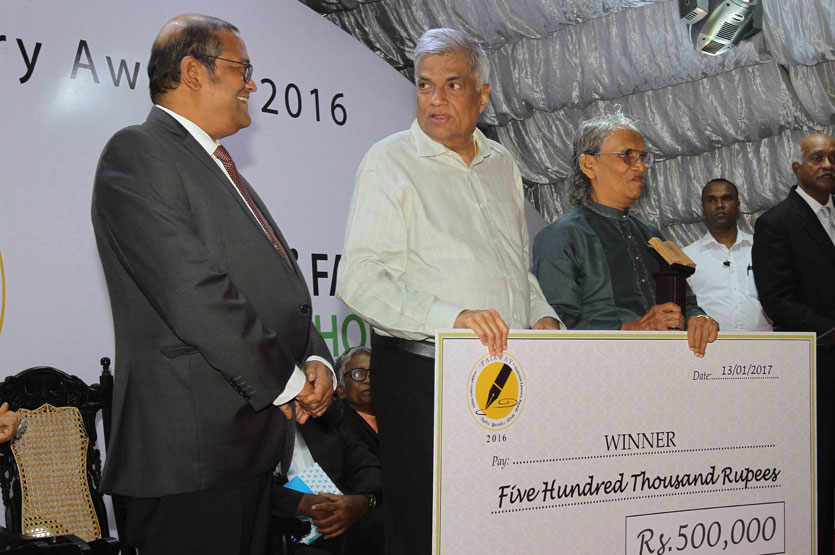
“I’m very happy” comments Tennyson Perera after receiving his award, “Maha Ravana is a modern novel and modern novels rarely get any awards so I’m happy to receive this.”
The English category paneled by Vivimarie van der Poorten, Nayomi Munaweera and Tissa Devendra shortlisted 4 novels; ‘The Dalada Chronicles’ by Shyam S. Dissanayake, ‘Celibacy Factor’ by Quintus G. Fernando, ‘First Utterance’ by Theena Kumaragurunathan and ‘Parallel Lives’ by Nanda Pethiyagoda.

Theena Kumaragurunathan walked away with the Award for Best English Novel for his book ‘First Utterance’. The panel described his work as ‘poetic, dramatic and genre defying, blending different forms of literature that is thought provoking.’
Speaking to us, he tells us that he is ‘speechless’. “I have no words; I’m utterly overwhelmed right now as this was not expected!”
The Tamil category paneled by Chitralega Maunaguru, Sopa Pathmanathan and Mohamed Rameez shortlisted 2 novels; ‘Panjam Pilaikka Vantha’ by M. Sivalingam and ‘Kalavan Kathikal’ by J. Wahabdeen.
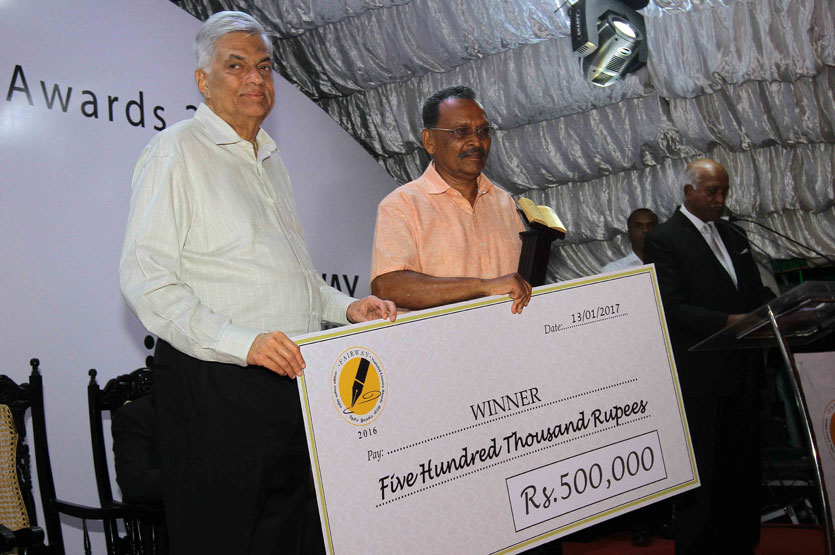
The award was received by M. Sivalingam for his novel ‘Panjam Pilaikka Vantha’. When asked, he explains to us that the novel is about how South Indian Tamils come to Sri Lanka during the British colony and the role they played in the plantation sector of Sri Lanka. “This is a community that hand a great hand in the Sri Lankan economy but still treated as a marginal community. I’m very happy that my book was given this recognition.”
The winner of each category would be awarded Rs. 500,000 each and shortlisted authors will receive Rs. 100,000 each. Publishing companies of the winning novels were also given due recognition.
Photographs by Kushan Pathiraja
TEXT by Panchali Illankoon and Jithendri Gomes
0 Comments